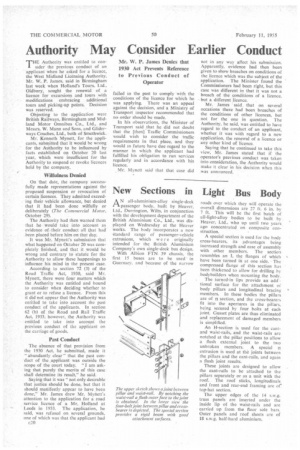Authority May Consider Earlier Conduct
Page 60

If you've noticed an error in this article please click here to report it so we can fix it.
THE Authority was entitled to con
stder the previous conduct of an applicant when he asked for a licence, the West Midland Licensing Authority, Mr. W. P. James, said in Birmingham last week when Holland's Tours, Ltd., Oldbury, sought the renewal of a licence for excursions and tours with modifications embracing additional tours and picking-up points. Decision was reserved.
Objecting to the application were British Railways, Birmingham and Midland Motor Omnibus Co., Ltd., and Messrs. W. Mann and Sons, and Gliderways Coaches, Ltd., both of Smethwick. Mr. Kenneth Mynett, for the applicants, submitted that it would be wrong for the Authority to be influenced by facts established on October 20 last year, which were insufficient for the Authority to suspend or revoke licences held by the company.
Wilfulness Denied On that date, the company successfully made representations against the proposed suspension or revocation of certain licences. They admitted exceeding their vehicle allowance, but denied that it had been done wilfully or deliberately (The Commercial Motor, October 29).
The Authority had then warned them that he would take into account as evidence of .their conduct all that had been placed before him on that day.
It was Mr. Mynctfs submission that what happened on October 20 was completely finished, and that it would be wrong and contrary to statute for the Authority to allow these happenings to influence his mind in the present case.
According to section 72 (3) of the Road Traffic Act, 1930, said Mr. Mynett, there were four matters which the Authority was entitled and bound to consider when deciding whether to grant or to refuse a licence. From this it did not appear that the Authority was entitled to take into account the past conduct of the applicants. in section 62 (b) of the Road and Rail Traffic Act, 1933, however, the Authority was entitled to take into account the previous conduct of the applicant on the carriage of goods.
Past Conduct
The absence of that provision from the 1930 Act, he submitted, made it "abundantly clear" that the past conduct of the ,applicant was outside the scope of the court today. "I am asking that purely the merits of this case shall determine its result," he said.
Saying that it was "not only desirable that justice should be done, but that it should manifestly appear to have been done," Mr. James drew Mr. Mynett's attention to the application for a road service licence of a Mr. Holland at Leeds in 1933. The application, he said, was refused on several grounds, one of which was that the applicant had c20 failed in the past to comply with the conditions of the licence for which he was applying. There was an appeal against the decision, and a Ministry of Transport inspector recommended that no order should be made.
In his observations, the Minister of Transport said that he did not doubt that the [then] Traffic Commissioners would wish to consider the traffic requirements in that place, and they would in future have due regard to the manner in which the applicant had fulfilled his obligation to run services regularly and in accordance with his licence.
Mr. Mynett said that that case did • not in any way affect his submission. Apparently, evidence had then been given to show breaches on conditions of the licence which was the subject of the application. The Minister found the Commissioners had been right, but this case was different in that it was not a breach of the conditions of a licence, but a different licence.
Mr. James said that on several occasions there had been breaches of the conditions of other licences, but not for the one in question. The Authority, he said, was entitled to have regard to the conduct of an applicant, whether it was with regard to a new application, the renewal of a licence or any other kind of licence.
Saying that he continued to take this view, Mr. James stated that if the operator's previous conduct was taken into consideration, the Authority would make it clear in his decision when this was announced.
















































































































